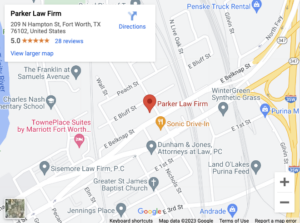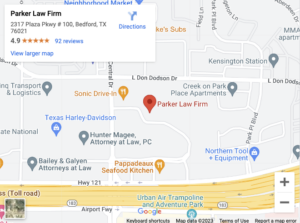
When a person fails to exercise reasonable care, they could be negligent. Negligence is the basis of most personal injury claims. You must prove negligence before recovering compensation for your injuries and damages.
Proving negligence can be challenging. Fortunately, an experienced Fort Worth personal injury lawyer can gather evidence and build a case to establish all of the necessary legal elements on your behalf.
What Do I Need To Know About Negligence and Personal Injury Cases in Fort Worth, TX?
Negligence is defined by the four legal elements required to prove liability for damages. The elements of negligence are:
- Duty of Care
- Breach of Duty
- Causation
- Injury & Damages
As the injured party, you have the burden of proving by a preponderance of the evidence each of the above elements is true.
Therefore, you must convince a jury that there is more than a 50% chance that your allegations are true. In other words, there is a better chance that the defendant injured you than not.
What Is a Duty of Care?
A duty is an obligation to perform some conduct. A legal duty of care means that a person has an obligation to act with a reasonable level of care to avoid causing someone injury or harm. Reasonableness is determined by what a person with “ordinary prudence” would have done in the same situation.
In other words, how would a reasonable person act if given the same facts and circumstances? For example, a reasonable person would not drive 100 mph in a school zone because they could injure a child. Likewise, a reasonable property owner would fix broken steps or warn people of the danger because they could be injured.
What Is a Breach of Duty in a Negligence Case?
A breach of duty is failing to meet the level of care for a specific situation. The party’s conduct was insufficient to satisfy the legal duty they owed to the injured party. In other words, the person acted in an unreasonable manner through their actions or omissions.
In our example above, a reasonable person would not speed through a school zone. Therefore, a breach of duty would be driving at excessive speeds through the school zone.
You Must Prove Causation To Win a Personal Injury Case
Proving that the person was negligent because they breached the duty of care does not result in compensation for damages. You must also prove that the person caused your injury by their actions or inactions.
For example, speeding through a school zone may be negligent. However, did it result in an injury or damage? In other words, did the person’s speed cause a pedestrian accident?
Let’s assume that a child is walking in a crosswalk. The driver is speeding and hits the child.
The driver hit the brakes but could not stop in time to avoid hitting the child. Therefore, their speed directly and proximately caused the child’s injury.
Proving causation can be one of the most challenging elements of a negligence claim.
You must prove direct cause or cause in fact. The test for direct cause is usually the “but for” test. The injury would not have occurred “but for” the conduct of the at-fault party.
However, you must also prove proximate cause (a/k/a legal cause). Your injuries must be a foreseeable and natural consequence of the other party’s conduct. A party might not be held liable for damages if they could not reasonably foresee their actions could result in injury or harm to another person.
Proving Injury and Damages To Recover Compensation for Negligence
The final element of a personal injury claim is proving you sustained injury and damages because of the at-fault party’s negligence. Injury and damages include:
- Bodily injury
- Death
- Financial losses
- Emotional harm
- Property damage
Evidence used to prove damages includes, but is not limited to, medical records, employment statements, expert opinions, and testimony.
In a personal injury case, the injured party can generally receive reimbursement for economic damages. Therefore, you could receive compensation for:
- Medical bills
- Lost wages
- Property damage
- Out-of-pocket expenses
- Personal care
- Rehabilitative therapies
- Future decrease in earning potential
However, some damages are not monetary. Non-economic damages represent the pain and suffering a person experiences because of another party’s negligence. Therefore, you could also receive compensation for your:
- Physical discomfort
- Impairment and disabilities
- Diminished quality of life
- Mental anguish
- Loss of enjoyment of life
- Emotional distress
- Scarring and disfigurement
The value of your damages depends on many factors. The severity of your injuries is a significant factor. However, your fault for causing your injury, the parties involved in the case, and the availability of insurance coverage can also determine how much your case is worth.
Our Fort Worth personal injury attorneys work with you to document your damages. We carefully analyze each aspect of your case to maximize the amount you receive for damages.
Schedule a Free Consultation With Our Fort Worth Personal Injury Lawyers
At Parker Law Firm Injury Lawyers, our experienced accident attorneys can work to prove negligence while you focus on recovering from your injuries. We can also fight to obtain the maximum compensation for your case. Contact an experienced personal injury attorney today at (817) 839-3143 for an initial free case evaluation.


